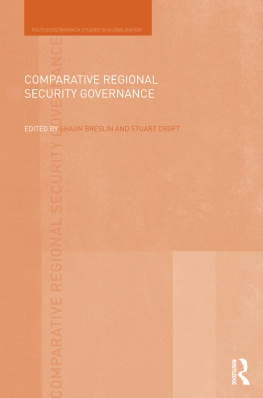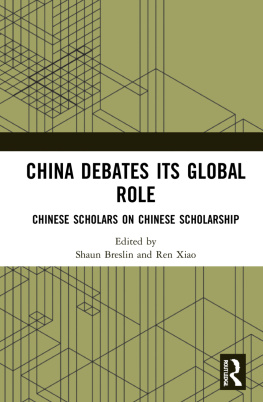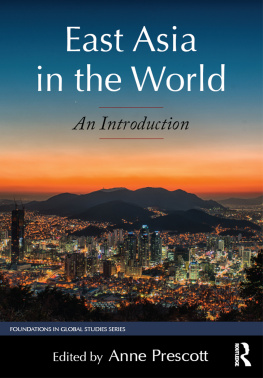
East Asia and the Global Crisis
Whilst Asia did not suffer the same sort of financial crisis that hit a number of developed Western economies in 2008, the region did face real economic challenges as exports to major economies plunged. At least as important, and arguably even more so, confidence also fell not just in the Western economies themselves, but in the economic and development principles that had come to dominate policy discourses and prescriptions for growth. The lesson of not just this period of turmoil but also the Asian financial crisis a decade earlier, was that relatively illiberal and state-guided financial systems seemed to fare better in times of uncertainty than those that had chosen (or been forced) down paths of every greater liberalisation.
This book traces how the global or should that be Western financial crisis impacted on East Asian economies, and the way that key regional states responded to the crisis. It considers the extent to which the region is decoupling from the global economy (or the West), the impact of crises on the definition of "region", and the effectiveness and functioning of regional institutions and governance mechanisms (including environmental governance). A key focus of the book is the increasing legitimacy of statist alternatives to (neo)liberal development strategies and modes of governance or perhaps more correctly, the extent to which the legitimacy of Western norms and practices have been delegitimized by the crisis.
This book was originally published as a special issue of Contemporary Politics.
Shaun Breslin is Professor of International Studies at the University of Warwick, where he is also Director of the Centre for the Study of Globalisation and Regionalisation. His research primarily focuses on the politics and international relations of contemporary China, and the study of comparative regionalism.
East Asia and the Global Crisis
Edited by
Shaun Breslin
First published 2012
by Routledge
2 Park Square, Milton Park, Abingdon, Oxon, OX14 4RN
Simultaneously published in the USA and Canada
by Routledge
711 Third Avenue, New York, NY 10017
Routledge is an imprint of the Taylor & Francis Group, an informa business
2012 Taylor & Francis
This book is a reproduction of Contemporary Politics, vol. 17, issue 2. The Publisher requests to those authors who may be citing this book to state, also, the bibliographical details of the special issue on which the book was based.
All rights reserved. No part of this book may be reprinted or reproduced or utilised in any form or by any electronic, mechanical, or other means, now known or hereafter invented, including photocopying and recording, or in any information storage or retrieval system, without permission in writing from the publishers.
Trademark notice: Product or corporate names may be trademarks or registered trademarks, and are used only for identification and explanation without intent to infringe.
British Library Cataloguing in Publication Data
A catalogue record for this book is available from the British Library
ISBN13: 978-0-415-50806-3
Typeset in Times New Roman
by Taylor & Francis Books
Publishers Note
The publisher would like to make readers aware that the chapters in this book may be referred to as articles as they are identical to the articles published in the special issue. The publisher accepts responsibility for any inconsistencies that may have arisen in the course of preparing this volume for print.
Contents
Shaun Breslin
Timothy J. Sinclair
Ralf Emmers and John Ravenhill
Richard Stubbs
Lorraine Elliott
Shaun Breslin
Takashi Terada and Bernard Ong
Shaun Breslin*
Centre for the Study of Globalisation and Regionalisation, University of Warwick, Coventry, UK
This paper introduces the special collection on East Asia and the global crisis. After justifying why a focus on East Asia is appropriate, it draws out the main themes that run through the individual contributions. These are the extent to which the region is decoupling from the global economy (or the West), the increasing legitimacy of statist alternatives to neoliberal development strategies, and the impact of crises on the definition of region and the functioning of regional institutions and governance mechanisms.
Introduction
Most crises are known by their origin, from the Mexican peso crisis of 1994/5 to the Asian crisis of 1997/8. Given there is no doubt who caused our worlds latest troubles, it should adopt its logical name: the Western financial crisis. This reluctance to call a spade a spade reflects an inability to reckon with changes the US and Europe have to make to avoid a repeat. (Mahbubani 2011)
Those who are familiar with the writings of Kishore Mahbubani will not be surprised that he has located the source (and blame) of the ongoing financial crisis clearly in the West. But he is not alone. Indeed, British journalist and historian Max Hastings (2008) referred to the then unfolding crisis as a Western one in as early as September 2008. Of course, this was before the fallout of what might then have seemed to be an Anglo-American problem began to spread ever wider, and gain a global descriptor and a new acronym GFC (global financial crisis). It was also before some analysts began to conclude that the real cause lay in systemic global imbalances between deficit and surplus economies; the manifestation of the problem might have been in the West, but the fundamental causes were global (Dunaway 2009). Nevertheless, the understanding that the crisis was made in the West, has had the biggest impact in the West, and fundamentally questions the Western way of doing things has retained considerable purchase; as Terada and Ong call it in this special issue, it is not so much a global crisis as a transatlantic financial crisis with global implications.
Why East Asia?
Of course, these global implications spread much further than East Asia. Sub-Saharan Africa has been strongly affected (Arieff et al. 2010, p. 1), Latin America has become a major and, in a sense, unexpected victim (Ocampo 2009, p. 703) and although higher oil prices have offset some of the impact, the global financial crisis has not spared the Middle East and North Africa region (IMF 2009). There are good grounds for having a special issue of a journal on all of these regions, either individually or in comparison. But if reasons are needed for justifying a special issue on East Asia, then perhaps five can be found.1
The first is simply to trace what the impact has actually been to date. Experience tells us that the true and long-term implications will not become clear for some time yet, but we can at least come to some preliminary assessments of how the ripples of this transatlantic crisis were felt in East Asia, and the short-term efficacy of East Asian responses. Here, the primary focus is on the economic impact, and the measures taken in East Asia to stimulate growth and/or insulate the region from further shocks and future crises; issues that are covered to varying degrees in all of the papers in this special issue. But there is more to the consequences of crisis that the obvious economic dimension, as we see in Elliotts contribution here which focuses on the indirect consequences for the environment and environmental politics in the region. In this first justification, there is nothing that sees East Asia as any different from any other part of the non-Western world it is a mapping and stock-taking exercise in the same way that others might consider the impact of the crisis elsewhere. But there is something that perhaps marks Asia as a special case in the second and third justifications.








